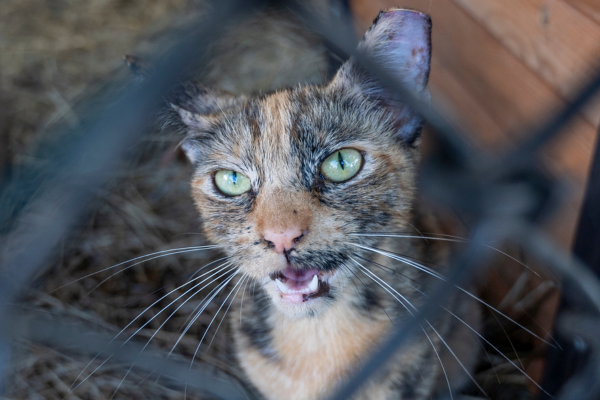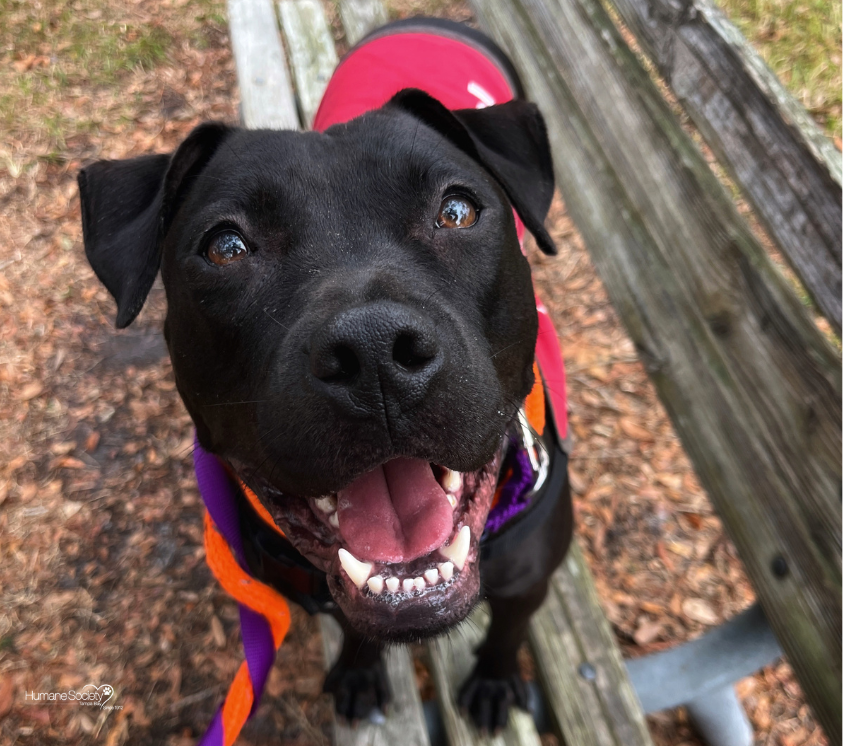If you’re a Florida resident you’re very familiar with hurricane season, which runs from June 1st through November 30th. Florida is projected to experience six hurricanes this season, two of which will be major hurricanes. We’re already in the midst of this time frame and it’s crucial to be proactive rather than reactive. While we usually receive some sort of warning before a hurricane reaches us, we should not wait until a disaster is approaching to prepare. The best protection from a natural disaster is a plan! Hurricanes can be scary and there’s a certain four-legged family member who’s counting on you to keep them safe and secure – your pet.
Storms are a leading cause of pets becoming lost and hurricanes unfortunately bring the possibility of evacuation, which heightens this problem. If you have to evacuate, don’t leave your pet behind! Pets left behind are at risk of being injured, lost, or killed. If it’s not safe for you to be in your home, then it isn’t safe for your pets either.
Below are our tips for what you can do – both now and during a disaster – to ensure your pet stays safe during the event of a hurricane.
What To Do NOW
ID your pet! In the event that your pet does get lost, identification will strongly increase your chances of being reunited with them. Microchipping is highly recommended, and you’ll want to be sure that the microchip registration is in your name and updated with current contact information. The average person doesn’t have a microchip scanner, however, so it’s a good idea to also have a collar ready to go with an ID tag securely attached. Putting your phone number on your pet’s ID tag makes it easy for someone to contact you right away.
Visit our shelter to pick up a FREE Disaster Bag to help you prepare. You can also easily create your own disaster kit.
Either way, include these items for your pet to bring if you need to evacuate:
– All current medications, including heartworm, flea and tick preventatives
– Current medical and vaccination records
– A minimum of 7 days’ worth of food and water – don’t forget a can opener and/or scooper!
– Food and water bowls
– Microchip ID number information
– A collar with rabies and ID tags and leashes (it’s never a bad idea to have backups)
– Pictures of you with your pets and of your pets alone, to prove ownership and help others identify them if you are separated
– List of unique markings your pet has
– Pet first-aid kit
– Poop bags
– Trash bags
– Toys and treats
– Litter boxes and litter
– A secure carrier or collapsible crate for each pet, large enough for them to stand comfortably and turn around
– Bedding and blankets
– Small container of disinfectant and paper towels
Find a safe place to evacuate to ahead of time. Ideally, this would be a friend or relative’s house, but it could also be an emergency shelter. Call your local office of emergency management before a disaster hits to see if you’ll be able to bring your pet to an emergency shelter – don’t assume! Pet-friendly shelters likely won’t be an option either as most of them will have extremely limited space in the event of a disaster.
Hillsborough County Emergency Info – 813.272.5900
Consider lining up a caregiver in your absence. If a hurricane hits while you’re away from home, have a contact who lives close to you, is comfortable with your pets, knows the location of your pet evacuation kit, and has access to your house.
What To Do THEN (During a Hurricane)
If you are evacuating, bring your pet and their disaster kit with you!
If you find yourself unable to go to a friend or relative’s house, locate pet-friendly hotels or shelter in the area you’ll be evacuating to and secure reservations.
If you’re staying at home, identify a safe area of the house where your family and pets can stay together, and put your emergency supplies in that room immediately. Bring pets indoors as soon as authorities say trouble is on the way and make sure they’re wearing identification. Close off any unsafe nooks and crannies where frightened cats may try to hide, and don’t let your pets roam loose!
Again, we urge you to recognize the importance of preparation! The last thing you want to do is be scrambling to keep your pet safe while you’re trying to figure out your own safe evacuation. Our pets cannot prepare for themselves in situations like this. It’s our job as pet parents to protect them, prepare for them, and be patient with them. If you are traveling with your pet make sure to keep them safe. Read how to keep you and your pet safe in an auto emergency here.
Additional Resources
A detailed, downloadable emergency preparedness document covering the needs of dogs, cats, horses, swine, cattle, birds, reptiles, and rabbits during a disaster. Checklists and contact log included.
Updated during disasters to show shelters accepting pets. It is very important that your pets are up-to-date on their shots as shelters will not allow pets to enter without proof of current vaccinations.
Find pet friendly hotels and accommodations.
Print and affix to a gallon-size plastic bag where you can store the listed items.




